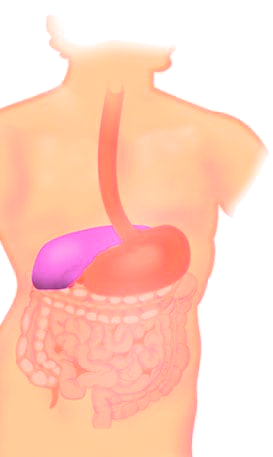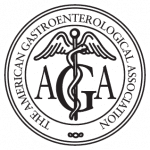Note: This procedure is performed at a local hospital.
ERCP is a specialized technique used to study the ducts (drainage routes) of the liver, gallbladder, and pancreas (the drainage channels from the liver are called bile ducts or biliary ducts). When performed by physicians with special training in this procedure, ERCP can be accomplished in 85-95% of patients. An endoscope (flexible thin tube that allows the physician to see inside the bowel) is passed through the mouth, esophagus, and stomach into the duodenum (first part of the small intestine). After the common opening to ducts from the liver and pancreas is visually identified, a catheter (narrow plastic tube) is passed through the endoscope into the ducts. Contrast material (“dye”) is then injected gently into the ducts (pancreatic or biliary) and x-rays are taken.
ERCP is a valuable tool that is used for diagnosing many diseases of the pancreas, bile ducts, liver, and gallbladder. Structural abnormalities suspected by symptoms, physical examination, laboratory tests, or x-rays can be shown in detail and biopsies of abnormal tissue can be obtained if necessary. ERCP can make the important distinction between whether jaundice (yellow discoloration of the eyes and skin) is caused by diseases that are treated medically, such as hepatitis, or structural diseases such as gallstones, tumors, or strictures (obstructing scar tissue) that are treated surgically or endoscopically. In patients who are not jaundiced but have pain or blood test abnormalities suggesting biliary of pancreatic disease, ERCP may also provide important diagnostic information. ERCP can be used to determine whether or not surgery is necessary and is helpful in providing the anatomic detail the surgeon needs to plan an operation when surgery is necessary. The information provided by an ERCP is far more detailed than that provided by standard x-rays or scans. Diagnostic ERCP is the necessary first step for therapeutic ERCP. Several conditions of the biliary or pancreatic ducts can be treated (cured or improved) by therapeutic ERCP techniques that can open the end of the bile duct, extract stones, and place stents (plastic drainage tubes) across obstructed ducts to improve their drainage.
It is necessary to have a completely empty stomach for the best (and safest) possible examination. You should have nothing to eat after midnight the night before. You may have liquids up until six (6) hours prior to your procedure.
You may take your heart or blood pressure medications with a sip of water the morning of your procedure.
IMPORTANT: Please either bring a list of your current medications, including over the counter medications or the bottles themselves to the facility where you are having your procedure. Also bring a list of your medication allergies with you to the procedure. Make sure your doctor’s office also has this information.
If you are diabetic: Contact your primary physician regarding medications for the day of your procedure.
If you are on blood thinners (such as Coumadin or aspirin): Contact our office as soon as possible during business hours ( 9:00 am – 5:00 pm ) if you have not already informed our staff.
If you have been told to take antibiotics prior to dental visits or diagnostic tests other than for hip/joint replacements: Contact our office as soon as possible during business hours ( 9:00 am – 5:00 pm ) if you have not already informed our staff.
Allergy to iodine-containing drugs (contrast material or “dye”) is not a contraindication to ERCP, but should be discussed with your physician the day of your procedure.
If ERCP will be done on an outpatient basis, a responsible adult must drive and accompany you home from the procedure because of the sedation used during the examination. Even if you feel alert after the procedure, your judgment and reflexes may be impaired by the sedation for the rest of the day making it unsafe for you to drive or operate any machinery. If a complication occurs, you may need to be hospitalized until it resolves.
Your physician will discuss why ERCP is being performed, potential complications from ERCP and alternative diagnostic or therapeutic tests that are available. A local anesthetic will be applied to your throat and an intravenous sedative may be given to make you more comfortable during the test. Some patients also receive antibiotics before the procedure. The procedure begins with you lying on your left side or stomach on an x-ray table. The endoscope is passed through the mouth, esophagus, and stomach into the duodenum. The instrument does not interfere with breathing. Air is introduced through the instrument and may cause temporary bloating during and after the procedure. The injection of contrast into the ducts rarely causes discomfort.
ERCP is generally a well-tolerated procedure when performed by physicians who have had special training and experience in this technique. Localized irritation of the vein into which medications were given may cause a tender lump that may last several weeks. The application of heat packs or hot moist towels to the area may ease the discomfort.
Major complications requiring hospitalization can occur, but are uncommon during diagnostic ERCP. They include serious pancreatitis, infections, bowel perforation, and bleeding with each occurring in less than 1% of patients. Another potential risk of ERCP is an adverse reaction to the sedative used. The risks of the procedure vary with the indications for the test, what is found during the procedure, what therapeutic intervention is undertaken, and the presence of other major medical problems, e.g. heart or lung diseases. Your physician will tell you what is your likelihood of complications before undergoing the test.
If therapeutic ERCP is performed (cutting an opening in the bile duct, stone removal, dilatation of a stricture, stent or drainage placement, etc.), the possibility of a complication is somewhat higher: Pancreatitis in 3-7%, bleeding requiring a transfusion in 3-5%, and bowel perforation in 1-2% of cases. These risks must be balanced against the potential benefits of the procedure and the risks of alternative surgical treatment of the condition. Often these complications can be managed without surgery, but occasionally they do require corrective surgery.
If you are having an ERCP as an outpatient, you will be kept under observation until most of the effects of the medications have worn off. If you have been given medications during the procedure you will not be allowed to drive, take a taxi, or ride the bus. A responsible adult must drive and accompany you home from the procedure because of the sedation used during the examination. Evidence of any complications of the procedure will be looked for and hospitalization may be advised if further observation is necessary. You may experience bloating or pass gas because of the air introduced during the examination. You may resume your usual diet unless you are instructed otherwise.
Because education is an important part of comprehensive medical care, you have been provided with this information to prepare you for this procedure. If you have any questions about your need for ERCP, alternative tests, the cost of the procedure, methods of billing, or insurance coverage, do not hesitate to speak to your doctor or doctor’s staff about it. Most endoscopists are highly trained specialists and welcome your questions regarding their credentials and training. If you have any questions that have not been answered, please discuss them with the endoscopy nurse or your physician before the examination begins.




